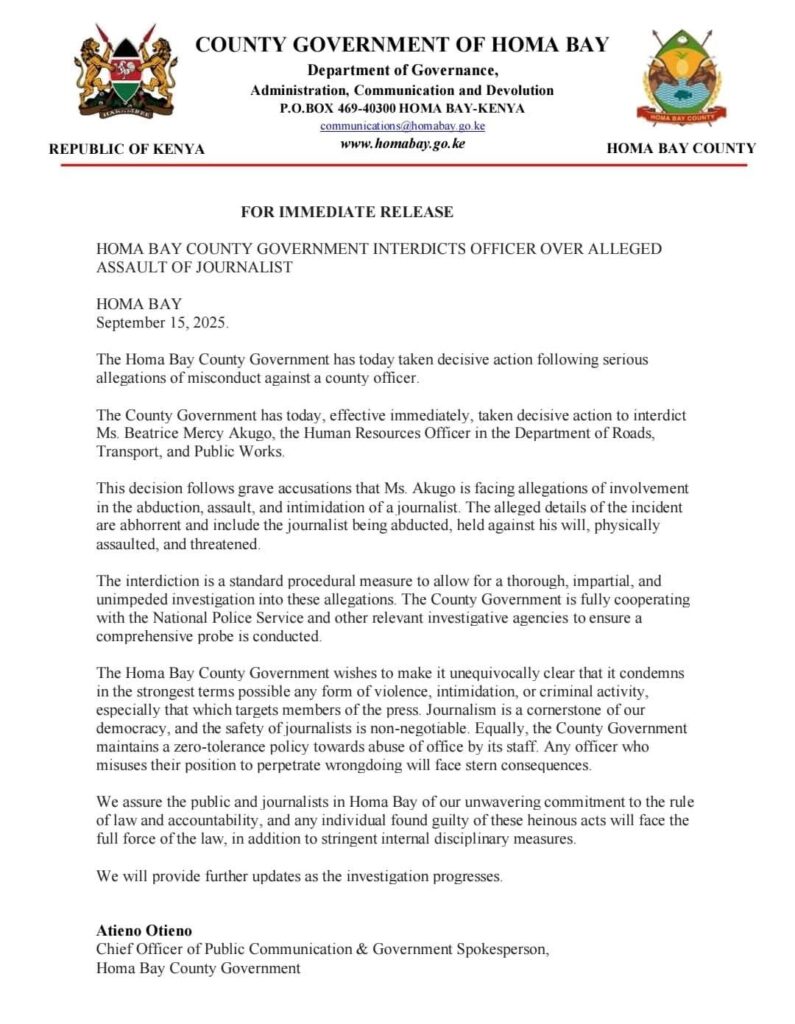The interdiction of Beatrice Mercy Akugo by the Homa Bay County Government has opened serious questions about the abuse of office and how public officials handle their positions.
As a Human Resources Officer, she was expected to protect the rights of workers and uphold integrity in her office, but the allegations against her paint a completely different picture.
The county confirmed that Akugo was interdicted after reports emerged that she was involved in the abduction and assault of People Daily journalist Habil Onyango.

Such an accusation is not only shameful for her as an individual but also damaging to the county administration, which now finds itself at the center of a scandal that undermines public trust.
The statement from the county described the interdiction as a procedural step to pave way for investigations, but the details surrounding the incident are too serious to ignore.
Onyango was allegedly abducted, assaulted, and threatened, with his freedom and safety stripped away in the hands of people who should never have had such power over him.
If Akugo is found guilty, her actions would amount to a betrayal of the public office she held, an office meant to serve, not to intimidate or destroy.

Atieno Otieno, the county’s spokesperson, tried to reassure the public by condemning the attack and stressing that journalism is a cornerstone of democracy.
While such words sound strong, they also expose the rot within the system when those accused of such heinous crimes are people trusted to serve the public.
The Media Council of Kenya (MCK) was categorical in its condemnation. It linked the attack to Onyango’s exposé on fake job scams in Homa Bay, a matter that touches directly on public interest.
By exposing how residents were being conned, Onyango was doing his duty as a journalist. The attack, however, was a direct attempt to silence him and send a chilling message to others who might dare to uncover the truth.
According to MCK, Onyango was lured to a hotel, ambushed, beaten, and his devices tampered with. The thugs even went as far as posting a fake apology under his name to discredit him. This is not just criminal behavior but an outright assault on freedom of expression and the safety of journalists in Kenya.
Akugo’s name being tied to this incident makes the matter even more disturbing. It suggests that public officials can misuse their positions to silence critics through violence, instead of engaging through lawful channels such as the Media Complaints Commission.

The MCK made it clear that violence against journalists is an attack on truth itself, and in this case, it reflects a dangerous trend where accountability is replaced with fear. That should not be allowed to stand in any democratic society.
The demand by MCK for immediate and transparent investigations must not be taken lightly. The Directorate of Criminal Investigations, IPOA, and the Office of the Director of Public Prosecutions have a responsibility to ensure that Akugo and any other accomplices are held to account. Anything less would send a message that violence against journalists is tolerated.
Habil Onyango’s ordeal is a reminder that Kenya’s democracy remains fragile when those with power can attempt to crush the press. Akugo’s interdiction is a small first step, but unless justice is done and seen to be done, it will mean nothing to the people of Homa Bay and the wider country.
This case must be treated as more than an internal county issue. It is a test of whether institutions can stand up to impunity and whether Kenya is serious about protecting journalists.
Akugo’s alleged role in this attack is not just a stain on her career but a direct insult to the principles of accountability and democracy.
The county has to act firmly, and the justice system has to ensure that this case ends with real consequences, not empty statements.
Otherwise, it will embolden others to follow the same path of intimidation and violence, leaving Kenya’s press freedom hanging by a thread.





















Add Comment